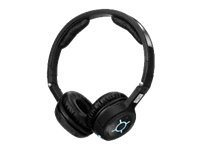
Complete technical specifications, details, expert ratings and review of Sennheiser PXC 310 BT. Find out how your chosen headphones stack up against the competition and whether they are the ones that best meet your expectations with the headphone comparison feature.
design and dimensions sound quality remote control cable battery and charging connections others
| DESIGN AND DIMENSIONS Sennheiser PXC 310 BT |
|---|
| Product Type | Headphones - Bluetooth - wireless |
|---|
The Sennheiser PXC 310 BT are wireless headphones. The wireless connection allows absolute freedom of movement and with that increases the comfort of using the headphones. This feature is very popular, especially when using headphones every day. The limiting factor of wireless headphones is a certain delay in the sound transmission between the source and the headphones (almost indistinguishable for a normal user), as well as the need to charge them (in the case of wired headphones, the headphones are recharged by connecting the cable itself). The headphones use the Bluetooth 2.1 EDR technology for sound transmission.
The design of the headphones is around the ears. Because of this design, the headphone envelops the entire ear and isolates the ear better from surrounding noise when listening compared to for example on-ear headphones. With that, they offer high-quality listening without interference. However, they are most likely heavier by design and less practical for frequent carrying. Although these are over-the-head headphones that are normally characterized by their bulky nature, this model can be folded into a more compact form. This makes them easier to fit into a backpack or bag
| SOUND QUALITY Sennheiser PXC 310 BT |
|---|
| Headphones Form Factor | Full size | |
|---|---|---|
| Headphones Technology | Dynamic | |
| Foldable | Yes | Better than 84 % of headphones rated. |
| Connectivity Technology | Wireless | |
| Wireless Technology | Bluetooth | |
| Bluetooth Version | Bluetooth 2.1 EDR | Worse than 77 % of headphones rated. |
| Bluetooth Profiles | Advanced Audio Distribution Profile (A2DP), Audio/Video Remote Control Profile (AVRCP) | |
| Active Noise Cancelling | Yes | Better than 92 % of headphones rated. |
| Active Noise Cancelling Technology | NoiseGard 2.0 active noise compensation | |
| Sound Output Mode | Stereo | |
| Frequency Response | 15 - 22000 Hz | Better than 76 % of headphones rated. |
| Sensitivity | 107 dB | Better than 68 % of headphones rated. |
| Impedance | 590 Ohm |
The sound quality can be affected by many factors. When it comes to frequency range, the wider it is, the more detail you will hear when listening. However, the range a person can perceive is highly individual. The average person is able to perceive frequencies in the range of 16 to 20 000 Hz. So the most common frequency range you will see on the market is 20 to 20,000 Hz. Lower frequencies up to approximately 256 Hz are considered bass frequencies. Therefore, the lower the bottom value is, the better the headphones will reproduce bass. Conversely, values from approximately 2 048 Hz upwards are treble. That is why headphones with a high upper value will provide a much more accurate reproduction of high notes. Sennheiser PXC 310 BT offers a frequency range of 15 - 22000 Hz. The sensitivity parameter determines how sensitively the headphones can receive the signal from the source. The higher the sensitivity value, the louder the headphones will be able to play with less power consumption. In general, a higher listening volume also means a higher power load for the connected device. So if you're buying headphones to listen to music from your mobile phone, for example, this is relevant to think about as you don't want to drain your phone's battery too much. Lower values around 85 dB are more suitable for listening in more quiet environments (for example, at home or in the office). Medium values of around 90 dB can provide good listening quality in noisier environments (for example, on public transport or in cafés). Headphones with high sensitivity values of around 100 dB or more are designed for really noisy environments, such as concerts. The Sennheiser PXC 310 BT has 107 dB.
The device connected to the headphones also plays a role most times. The lower impedance value (approximately 100 to 150 Ohms) is suitable for playback from mobile phones, laptops or other portable players that do not have a powerful enough amplifier. The lower impedance will ensure that the required volume level is achieved with less power, thus extending the life of the player. However, at the same time, with lower impedance, there is more distortion of the sound. Headphones with a higher impedance of around 250 Ohms and above are then more suitable for playback from really powerful signal sources or using a headphone amplifier, otherwise the sound coming out of them might not be loud enough. At the same time, higher-impedance headphones will also ensure less distortion in the sound. In the case of these headphones, the impedance reaches the 590 Ohm value.
For an even more undisturbed listening experience, the headphones have a special Active Noise Canceling feature.
| REMOTE CONTROL Sennheiser PXC 310 BT |
|---|
| Controls | Volume |
|---|
| CABLE Sennheiser PXC 310 BT |
|---|
| Cable Type |
Headphones cable Airplane connection adapter Headphones adapter |
|---|
| BATTERY AND CHARGING Sennheiser PXC 310 BT |
|---|
| Battery Type | Battery rechargeable |
|---|
| CONNECTIONS Sennheiser PXC 310 BT |
|---|
| Connector Type | Headphones (mini-phone stereo 3.5 mm) |
|---|
| OTHERS Sennheiser PXC 310 BT |
|---|
| Included Accessories | Carrying case, 6.3 mm (1/4") stereo adapter | |
|---|---|---|
| Service & Support | Limited warranty - 2 years |
Similar Headphones
Other Sennheiser Headphones